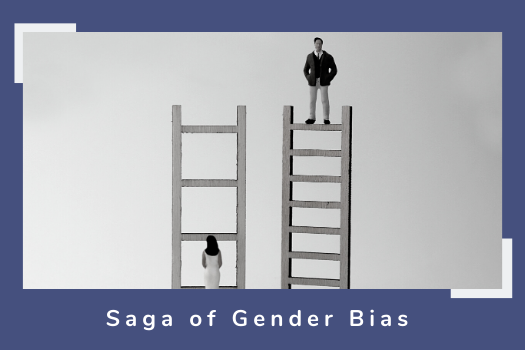...And the saga of Gender Bias continues
Employee Engagement, Employee Relations, Rewards and Recognition
Shalini was waiting eagerly for her Chartered Accountancy Final Results. She was about to reap the benefits of 5 years of intense struggle and hard work.
Five years earlier, when she filled the registration form of CA Foundation, everyone haunted her through his or her advice.
“This is the hardest professional course in India”,
“It is only made for the extremely meritorious students”,
“Only 1% people can clear through these exams.”
However, denying everyone’s advice, she filled the registration form. CA Foundation results were declared, and she secured 29th position in the country. It marked the beginning of a new chapter in her life.
Today, after so many years of isolation phase and three years of intense articleship, she was on the verge of adding the prestigious prefix “CA” against her name.
Finally, results announced at 4 pm and she again lived up to the expectations of the family and friends. Yes, she was CA Shalini Gupta today.
However, she wasn’t aware that this wasn’t an end to the struggle; it was just a beginning to even more intense battle and phase of frustration – Job Search.
It had already been a few days since she qualified as a chartered accountant but she was still searching for a job. She was losing her confidence as the days passed. Everyone could feel frustration and low self-esteem in her behavior.
“Hey Shalini, what happened? You are not fine today?” her friend Shubham asked.
“Job hunting is a frustrating process, Shubham”, Shalini said.
“Frustrating? How can it be frustrating for a chartered accountant? Lots of jobs get listed on job portals and even on LinkedIn. Just send across your CV, and I’m sure several opportunities will knock you soon.”
“You don’t understand it is not so easy. Most of these companies prefer to hire male candidates. Even in some places, they want ONLY male candidates”, she replied in a low tone.
This seemed really awkward to Shubham because he never thought job recruitment could be sexist.
“You must be crazy. I can’t imagine anything like happening in reality. How can there be “males only” preference for a job position? A chartered accountant is a chartered accountant. How can somebody differentiate a CA between a girl and a boy?”
Shalini was already frustrated, and Shubham’s reply fumed her anger. She opened her laptop and typed a job portal’s name on Google.
She searched for “Jobs for Fresher CAs”, and 30 results appeared. Out of those, as many as 15 employers invited job applications only from male candidates, while six other employers preferred recruiting male candidates over female candidates.
Shubham was surprised.
Shalini didn’t stop here. She opened LinkedIn and searched for posts calling Fresher CAs to apply for job positions. Many of them mentioned “Males are preferred” or “Only male candidates can apply” as the requirement.
Shubham felt defeated realizing that he was thinking wrongly. Gender Biases exists in the recruitment.
The other day I read about how a woman went up to her boss to complain about sexual harassment in the workplace. And, all the boss had to say was this:
“I empathize with you, but who told you to work in a dominating male industry?” he said while laughing with four other people.
We talk about sexual harassment at workplaces, yet often we forget to discuss the most crucial factor that leads to sexual harassment which is – the preference of only male candidates on job portals.
According to a recent Randstand Workmonitor Survey, 55% respondents said that males are preferred over females for positions for which both are equally qualified. Globally, the ratio is even higher, where more than 70% of respondents agreed with this. Interestingly, out of the 55% Indian respondents, 61% of males agreed with gender biases during recruitment.
Ironically, even female recruiters prefer male candidates during recruitment.
This is because there are certain stereotypes attached to males which include – “Males can devote their entire day to the organization”, “Males can do any given assignment” etc. and hence during almost all recruitments, males are preferred over females.
It is assumed that females can’t do overtime in office and that their commitment to work after marriage is uncertain. Hence organizations are afraid of investing time and resources in female candidates.
While most companies prefer a male employee for field jobs that require sheer hard work but hard work isn’t a synonym for the male gender. Instead, applications may be invited from everyone and then let the interview decide who the deserving candidate should be.
The saddest part of the story is the fact that almost all senior-level positions are occupied by males. Indian firms don’t have many females in their top management and the problem lies at the grass root level – they aren’t recruited in high numbers, so naturally, their chances of reaching more senior positions are lesser. Plus, ‘masculine style of leadership’, ‘patience’ and ‘full devotion’ is something which is deemed to be attached only to males and hence they are always preferred for jobs that directly affect the revenue of the company.
I can’t understand why females are always underestimated during recruitment. What needs to be understood is that we have to abolish gender biases during recruitment processes, if we are to make workplaces a safe zone for women.






